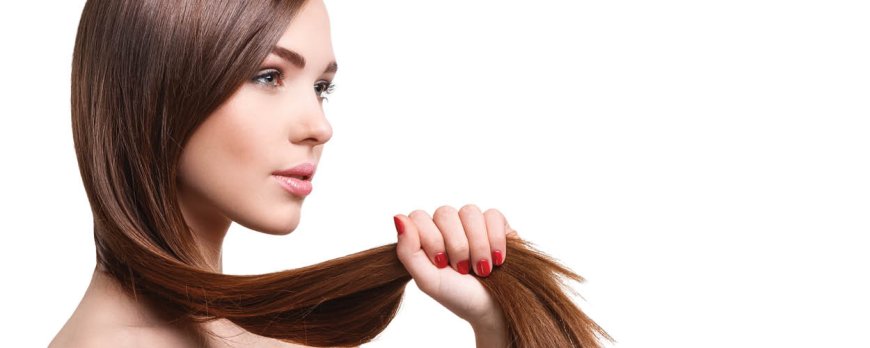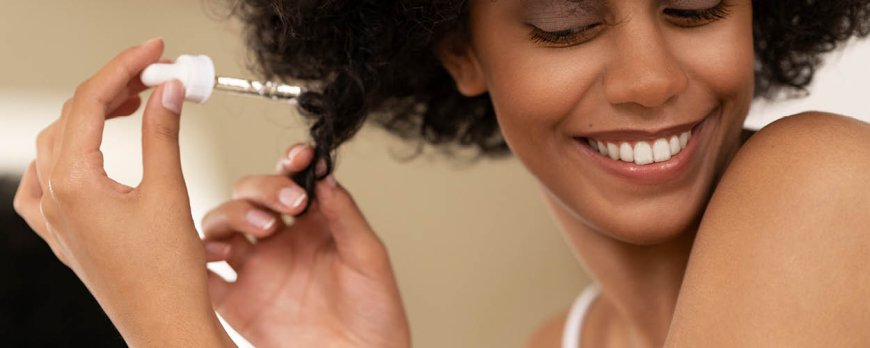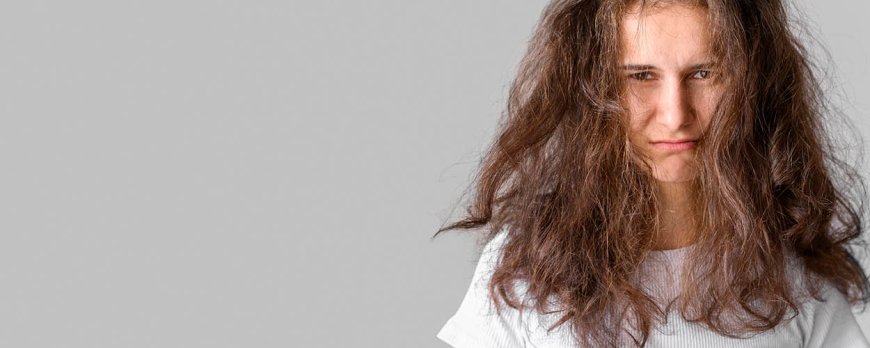Does hair grow slower as you age?
Uncover the truth: Does hair grow slower as you age? Dive in to explore the relationship between aging and hair growth rate.

Does hair grow slower as you age?
Many people wonder if hair growth slows as they get older. It is a common observation that as we age, our hair seems to lose its thickness and density. But is this perception accurate? Let's explore the factors that may contribute to slower hair growth with age.
Key Takeaways:
- Hair growth does slow down as you age due to hormonal changes, genetic factors, and the natural aging process.
- As people get older, their hair follicles become less efficient at growing new hair, resulting in slower growth.
- Hair strands can become finer, thinner, and more prone to breakage, making it difficult to maintain a full, thick head of hair.
- Hair loss is common as people age, with conditions like androgenic alopecia and female pattern hair loss contributing to the decline in hair volume.
- Treatments such as medications like finasteride and minoxidil can help slow down hair loss and stimulate hair growth.
- Taking care of the scalp, following a healthy diet, and addressing possible nutritional deficiencies can also support hair growth.
The Hair Growth Process
Before understanding the impact of age on hair growth, it's important to grasp the hair growth process. Hair growth occurs in cycles and goes through three main phases: anagen, catagen, and telogen.
Anagen phase: This is the active growth phase of the hair follicles. During this stage, cells at the base of the hair follicles divide rapidly, producing new hair strands. The length of the anagen phase determines how long the hair can grow, which typically lasts between two to six years.
Catagen phase: After the anagen phase, the hair follicles enter a transitional phase called catagen. This phase lasts for about two to three weeks. During catagen, hair growth stops, and the hair follicles shrink.
Telogen phase: The telogen phase is the resting phase of the hair growth cycle and lasts for about two to three months. During this phase, the hair follicles are dormant, and the old hairs eventually shed to make way for new hair growth.
It's important to note that each hair follicle operates independently, so the hair on our head is at different stages of the growth cycle at any given time. Understanding this hair growth process provides a foundation for comprehending how aging affects the rate of hair growth.

Factors Affecting Hair Growth
Several factors can influence the rate of hair growth, and age is one of them. As we get older, our hair growth tends to slow down due to a combination of hormonal changes, genetic factors, and the natural aging process. The efficiency of our hair follicles decreases, making it harder for new hair to grow. This results in slower hair growth overall.
Another factor that can affect hair growth with age is the quality of the hair strands themselves. They can become finer, thinner, and more prone to breakage, which can make it challenging to maintain the thickness and fullness of hair. Additionally, hair loss becomes more common as we age, with conditions like androgenic alopecia and female pattern hair loss contributing to the decline in hair volume.
Fortunately, there are various treatment options available to slow down hair loss and stimulate hair growth. Medications like finasteride and minoxidil can be effective in promoting hair regrowth. Taking care of the scalp is also crucial for maintaining healthy hair growth, as the aging process can impact scalp health. Following a healthy diet, rich in nutrients, can support optimal hair growth as well. Addressing any possible nutritional deficiencies is essential for maintaining healthy hair.
Factors Affecting Hair Growth:
- Age: Hair growth tends to slow down as we age due to hormonal changes and decreased efficiency of hair follicles.
- Genetic factors: Some individuals may have genetically determined hair growth patterns that result in slower growth.
- Hormonal changes: Fluctuations in hormone levels, such as those experienced during menopause, can affect hair growth.
- Scalp health: A healthy scalp environment is vital for promoting optimal hair growth.
- Stress and lifestyle factors: High levels of stress and an unhealthy lifestyle can negatively impact hair growth.
In conclusion, hair growth does slow down with age due to several factors, including hormonal changes, genetic factors, and the natural aging process. However, various treatments and lifestyle changes can support hair growth and help slow down hair loss. Taking care of the scalp, following a healthy diet, and addressing possible nutritional deficiencies are all essential aspects of maintaining and promoting healthy hair growth at any age.

Slowing Hair Growth with Age
As people age, they may notice a gradual slowing down of their hair growth. This is a natural part of the aging process and can be attributed to various factors. One of the primary factors is hormonal changes. As we get older, the levels of hormones that stimulate hair growth, such as estrogen and testosterone, begin to decline. This decrease in hormonal activity can directly affect the speed at which hair grows.
In addition to hormonal changes, genetic factors also play a role in the slowing of hair growth with age. Certain individuals are genetically predisposed to have hair follicles that are less efficient at producing new hair as they age. This can result in a noticeable decrease in hair growth rate over time.
Another reason for slow hair growth is the natural aging process itself. Over time, the hair follicles become less active and produce thinner, finer hair strands. These strands are more prone to breakage and are less able to maintain a full, thick appearance. As a result, individuals may notice that their hair becomes less voluminous and takes longer to grow.
While the slowing of hair growth with age is a common occurrence, there are ways to address this issue. Treatments such as finasteride and minoxidil can help slow down hair loss and stimulate new hair growth. Taking care of the scalp through regular cleansing and exfoliation can also promote healthier hair growth. Additionally, following a healthy diet that includes essential nutrients like vitamins A, C, and E, as well as iron and biotin, can support optimal hair growth.
Hair Loss and Aging
Hair loss is a common concern for many people as they age. As we get older, our hair growth rate naturally slows down due to a combination of factors. Hormonal changes, genetic factors, and the aging process all play a role in this decline. The efficiency of our hair follicles decreases, resulting in slower hair growth. Additionally, the quality of our hair strands can change, becoming finer, thinner, and more susceptible to breakage, which can contribute to the appearance of thinning hair.
Common Conditions
There are several common conditions that contribute to hair loss in aging individuals. Androgenic alopecia, often referred to as male or female pattern baldness, is a genetic condition that leads to a gradual thinning of the hair. In men, this typically manifests as a receding hairline and balding on the crown of the head. Women tend to experience a more diffuse thinning of the hair. Female pattern hair loss is another condition that can cause hair to become thinner and more brittle over time.
Treatment Options
Fortunately, there are treatment options available to help slow down hair loss and stimulate hair growth. Medications like finasteride and minoxidil have been shown to be effective in preserving existing hair and promoting new growth. These treatments work by targeting the underlying factors contributing to hair loss, such as hormonal imbalances and blood flow to the hair follicles. It's important to consult with a healthcare professional before starting any treatment to determine the best course of action for your individual needs.
Care and Maintenance
While it may not be possible to completely prevent hair loss with age, there are steps you can take to support healthy hair growth. Taking care of your scalp is essential, as a healthy scalp provides a strong foundation for hair follicles to thrive. This includes regular cleansing, moisturizing, and avoiding harsh styling practices that can damage the hair. Following a balanced diet that includes essential nutrients like vitamins A, C, and E, as well as iron and biotin, can also promote healthy hair growth. If you suspect a nutritional deficiency may be contributing to your hair loss, it's advisable to speak with a healthcare professional for guidance on addressing any deficiencies.

Treatment Options
There are various treatment options to address hair loss and stimulate hair growth, regardless of age. These treatments are designed to target the underlying causes of hair loss and promote the growth of new, healthy hair.
One common treatment option is medication, such as finasteride and minoxidil. Finasteride is an oral medication that can help inhibit the production of DHT, a hormone that contributes to hair loss. Minoxidil, on the other hand, is a topical solution that can stimulate hair growth by increasing blood flow to the hair follicles.
H3: Lifestyle Changes
In addition to medication, certain lifestyle changes can also support hair growth. Taking care of the scalp is essential, as a healthy scalp promotes healthy hair growth. This can be done by gently cleansing the scalp, avoiding excessive heat styling, and using products that are suitable for your hair type.
Focusing on a healthy diet is another important aspect. A balanced diet that includes essential nutrients like vitamins A, C, D, E, and minerals like iron and zinc can help support hair growth. Additionally, addressing any nutritional deficiencies, such as through supplementation, can have a positive impact on the health of your hair.
By combining these treatment options and making necessary lifestyle changes, it is possible to slow down hair loss and stimulate new hair growth, regardless of age.
Taking Care of the Scalp
Maintaining a healthy scalp is crucial for supporting optimal hair growth, particularly as you age. The condition of your scalp plays a vital role in the health and strength of your hair follicles. Here are some tips to help you take care of your scalp:
- Gentle cleansing: Use a mild shampoo and conditioner to cleanse your scalp and hair. Avoid harsh products that can strip away natural oils and cause dryness.
- Regular exfoliation: Exfoliating your scalp can remove dead skin cells, product buildup, and excess oil, promoting a healthier environment for hair growth. You can use a scalp scrub or a gentle exfoliating brush for this purpose.
- Proper hydration: Keep your scalp hydrated by drinking an adequate amount of water and using moisturizing products. A well-hydrated scalp helps maintain the elasticity and strength of your hair.
- Avoid excessive heat: Limit the use of heat styling tools like straighteners and curling irons, as they can damage your hair and scalp. If you do use heat, always use a heat protectant spray and keep the temperature moderate.
Additionally, it's important to pay attention to any signs of scalp issues, such as dryness, itchiness, or dandruff. These conditions can disrupt the hair growth process. If you're experiencing persistent scalp problems, it's advisable to consult with a dermatologist or trichologist for proper diagnosis and treatment.
By taking proper care of your scalp, you can create an optimal environment for healthy hair growth, regardless of age. Remember to be gentle, nourish your scalp with hydration, and address any scalp issues promptly. Your scalp health is essential for supporting the natural hair growth process.

Following a Healthy Diet
Proper nutrition plays a key role in maintaining healthy hair growth, regardless of age. By consuming a balanced diet that includes essential vitamins, minerals, and nutrients, you can support your hair follicles and promote optimal hair growth.
Here are some dietary factors to consider for healthy hair:
- Protein: Including sufficient amounts of protein in your diet is crucial for hair growth. Foods such as lean meats, eggs, fish, and legumes are excellent sources of protein.
- Iron: Iron deficiency can contribute to hair loss, so it's important to include iron-rich foods like spinach, red meat, and lentils in your meals.
- Vitamin C: This vitamin helps in the absorption of iron and promotes collagen production, which is essential for hair strength. Citrus fruits, strawberries, and bell peppers are high in vitamin C.
- Omega-3 fatty acids: Found in fatty fish, walnuts, and flaxseeds, omega-3 fatty acids provide essential nutrients for hair growth, while also supporting scalp health.
Addressing Nutritional Deficiencies
If you suspect that you may have nutritional deficiencies contributing to hair problems, consulting with a healthcare professional or a registered dietitian can be helpful. They can assess your nutrient levels and provide tailored dietary recommendations or suggest supplements if necessary.
Remember, it's important to maintain a well-rounded diet, rather than relying solely on supplements. A healthy lifestyle, including regular exercise, adequate hydration, and stress management, can also contribute to overall hair health.
Addressing Nutritional Deficiencies
Nutritional deficiencies can significantly impact hair growth, but they can be addressed through proper dietary choices and supplements. Maintaining a balanced diet that includes essential vitamins, minerals, and proteins is crucial for promoting healthy hair growth, especially as we age. Here are some key nutrients that play a vital role in supporting hair health:
Vitamin A
Vitamin A helps in the production of sebum, which is the natural oil that moisturizes the scalp and keeps hair healthy. Sources of vitamin A include carrots, sweet potatoes, spinach, and kale. Including these foods in your diet can help prevent a dry scalp and promote hair growth.
Biotin
Biotin, also known as vitamin H, is essential for strong and healthy hair. It helps in the production of keratin, a protein that makes up the structure of hair. Foods rich in biotin include eggs, nuts, seeds, and salmon. If necessary, biotin supplements can also be taken, but it's important to consult a healthcare professional before starting any new supplements.
Omega-3 Fatty Acids
Omega-3 fatty acids play a crucial role in nourishing hair follicles and promoting hair growth. Fish, such as salmon and sardines, are excellent sources of omega-3 fatty acids. For vegetarians and vegans, flaxseeds, chia seeds, and walnuts are good alternatives.
In addition to including these nutrients in your diet, it's recommended to limit the consumption of processed foods, as they often lack the essential nutrients needed for healthy hair growth. A well-balanced diet, along with regular exercise and proper hair care, can help address nutritional deficiencies and support optimal hair growth, even as we age.
Conclusion
In conclusion, hair growth does tend to slow down as people age, but there are various factors and treatments that can help maintain healthy hair growth regardless of age.
As we get older, our hair follicles become less efficient at growing new hair, resulting in slower growth. Additionally, the strands themselves can become finer, thinner, and more prone to breakage, which can make it challenging to maintain a full, thick head of hair.
However, there are treatments available to address these concerns. Medications like finasteride and minoxidil can help slow down hair loss and stimulate new hair growth. These treatments have been shown to be effective in combating conditions like androgenic alopecia and female pattern hair loss.
In addition to medical treatments, taking care of the scalp is crucial for promoting healthy hair growth. Maintaining a clean and well-nourished scalp can help create an optimal environment for hair follicles to thrive. Following a balanced diet that includes essential nutrients like vitamins, minerals, and proteins is also important for supporting hair growth.
By addressing potential nutritional deficiencies and maintaining scalp health, individuals can support healthy hair growth regardless of age. While hair growth may slow down as we age, there are steps we can take to maintain strong and voluminous hair.
FAQ
Does hair grow slower as you age?
Yes, hair growth does slow down as you age. This is due to several factors, including hormonal changes, genetic factors, and the natural aging process.
What factors affect hair growth?
Various factors can influence hair growth, including age, hormonal changes, and genetic factors.
How does aging affect hair growth?
Aging can lead to decreased efficiency of hair follicles and changes in hair strand quality, resulting in slower hair growth.
Is hair loss common with aging?
Yes, hair loss is common as people age, with conditions like androgenic alopecia and female pattern hair loss contributing to the decline in hair volume.
Are there treatments available for hair loss?
Yes, there are treatments available, such as medications like finasteride and minoxidil, which can help slow down hair loss and stimulate hair growth.
How can I take care of my scalp for healthy hair growth?
Taking care of the scalp is important for promoting healthy hair growth, especially as the aging process can impact scalp health. Regular cleansing and moisturizing can help maintain a healthy scalp environment.
Does diet affect hair growth?
Yes, following a healthy diet is important for maintaining healthy hair growth. A balanced diet rich in nutrients can support hair health.
What should I do to address nutritional deficiencies for hair growth?
Addressing possible nutritional deficiencies through dietary changes or supplements can help support hair growth. Consulting with a healthcare professional is recommended for personalized advice.


































































































































